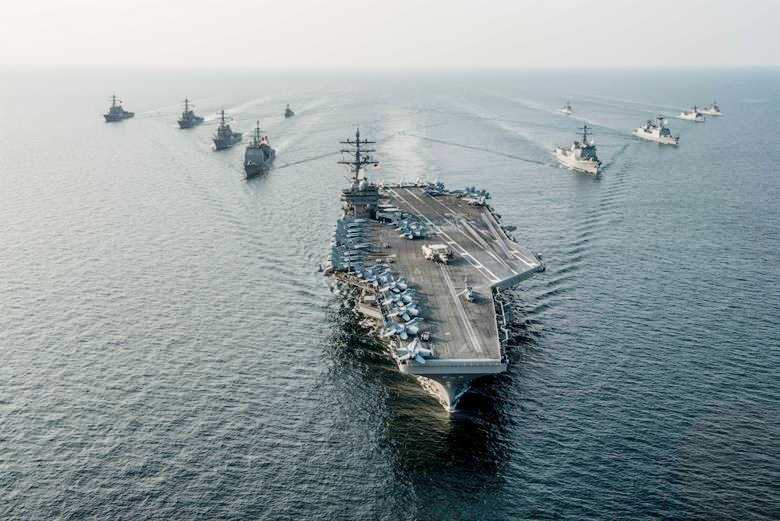Washington/Taipei: – The United States and Taiwan signed an important agreement for the development of infrastructural facilities in the Latin American and south-east Asian countries. It is said that this agreement has been made to reduce the dependence of these Asian and Latin American countries, on China. The movements for a trade agreement also have started, while signing this agreement. 50 US Senators have written a letter to the Trump administration demanding that a trade agreement should be signed with Taiwan. The signing of the ‘Infrastructure Deal’ and the possible trade agreement with Taiwan, is considered to be an important stage in the trade and political conflict of the United States against China.
 US President Donald Trump has taken a more active stand on the issue of cooperation with Taiwan. The diplomatic office started by the United States in Taiwan, the meeting between US National Security Advisor and the Taiwanese leaders and the increasing defence cooperation, are an important part of President Trump’s strategy. President Trump took the historic decision, to supply fighter jets to Taiwan, after a long gap of nearly three decades. After that, two senior US officials visited Taiwan in the last two months. The new agreement signed with Taiwan also is believed to be the next stage of the same policy.
US President Donald Trump has taken a more active stand on the issue of cooperation with Taiwan. The diplomatic office started by the United States in Taiwan, the meeting between US National Security Advisor and the Taiwanese leaders and the increasing defence cooperation, are an important part of President Trump’s strategy. President Trump took the historic decision, to supply fighter jets to Taiwan, after a long gap of nearly three decades. After that, two senior US officials visited Taiwan in the last two months. The new agreement signed with Taiwan also is believed to be the next stage of the same policy.
The ‘American Institute in Taiwan’ known as the US embassy in Taiwan and ‘Taipei Economic and Cultural Representative Office’ signed the agreement. The agreement has been named ‘Framework to Strengthen Infrastructure Finance and Market Building Cooperation’. Through this agreement, the United States will be seeking cooperation from Taiwan, for the infrastructure projects to be implemented in south-east Asia and Latin America. At the same time, there are indications that efforts will also be made to break the Chinese domination in the ‘Global Supply Chain’ by creating an alternative system. The Taiwanese sources claimed that this agreement would help in strengthening the Taiwanese relations with the countries, who have not officially accepted Taiwan as an independent country. While this agreement is being signed, efforts have started in the US Congress to increase closeness with Taiwan.
 50 Republican and Democratic Senators have written a letter to the US Trade Representative Robert Lighthizer. In this letter, the Senators have taken a stand that a trade agreement is necessary with Taiwan and have demanded that talks in this regard, should be started. The US Senators have taken an insistent stand regarding the trade agreement saying ‘The United States is taking the initiative for an open Indo-Pacific sector and trade agreements with like-minded countries is important from this point of view. A trade agreement with a country like Taiwan could be handy, to counter the inappropriate trade practices of China. This will deliver a message to other countries that a country like Taiwan, who believes in free markets and healthy competition, can be a trusted trading partner.’ Keith Krach, a senior US official, had met the Taiwanese trade department officials, during his visit to Taiwan, in the last month. These activities started after that, become significant.
50 Republican and Democratic Senators have written a letter to the US Trade Representative Robert Lighthizer. In this letter, the Senators have taken a stand that a trade agreement is necessary with Taiwan and have demanded that talks in this regard, should be started. The US Senators have taken an insistent stand regarding the trade agreement saying ‘The United States is taking the initiative for an open Indo-Pacific sector and trade agreements with like-minded countries is important from this point of view. A trade agreement with a country like Taiwan could be handy, to counter the inappropriate trade practices of China. This will deliver a message to other countries that a country like Taiwan, who believes in free markets and healthy competition, can be a trusted trading partner.’ Keith Krach, a senior US official, had met the Taiwanese trade department officials, during his visit to Taiwan, in the last month. These activities started after that, become significant.
Meanwhile, it has been observed that other countries too are becoming aggressive on the Taiwan issue, following the United States. Taiwanese defence ministry informed that a Canadian patrol vessel sailed through the Gulf of Taiwan, a few days ago. As per the claims in the local media, this patrol vessel was a part of the Freedom of Navigation Operation of the United States. But the United States or Canada had not reacted over this matter. Before this, a Canadian warship had sailed through the Gulf of Taiwan in September, last year. Ships from Japan, France, Australia, along with the United States, had sailed through the South China Sea, challenging China. Now even Canada seems to have been added to the list.













